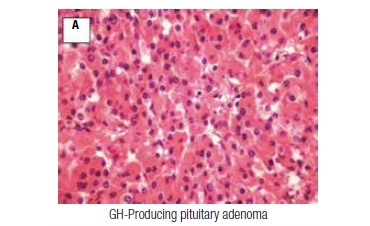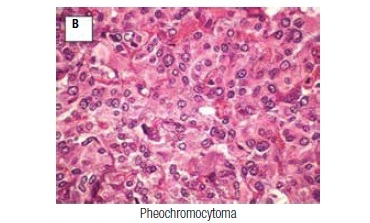We report on an adult woman with rare coexistence of acromegaly, pheochromocytoma (PHEO), gastrointestinal stromal tumor (GIST), intestinal polyposis, and thyroid follicular adenoma. At the age of 56, she was diagnosed with acromegaly caused by a pituitary macroadenoma, treated by transsphenoidal surgery, radiotherapy, and octreotide. During routine colonoscopy, multiple polyps were identified as tubular adenomas with high-grade dysplasia on histology. Years later, an abdominal mass of 8.0 x 6.2 cm was detected by routine ultrasound. Surgical exploration revealed an adrenal mass and another tumor adhered to the lesser gastric curvature, which were removed. Pathology confirmed the diagnosis of PHEO and GIST. PHEO immunohistochemistry was negative for GHRH. During follow-up, nodular goiter was found with normal levels of calcitonin and inconclusive cytology. Near-total thyroidectomy was performed, revealing a follicular adenoma. Her family history was negative for all of these tumor types. Genetic analysis for PHEO/paraganglioma genes (SDH A-D, SDHAF2, RET, VHL, TMEM127, and MAX), and pituitary-related genes (AIP, MEN1, and p27) were negative. Though the finding of PHEO and acromegaly with multiple other tumors could be a fortuitous coexistence, we suggest that this case may represent a new variant of MEN syndrome with a de novo germline mutation in a not yet identified gene. Arq Bras Endocrinol Metab. 2012;56(8):507-12





